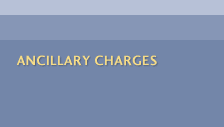 |
Ancillary Charges
Including Glossary of Surcharges, Charges, Rules and Service Terms
Transpacific shipping lines assess a number of ancillary charges for the movement of cargo, in addition to base freight rates. These charges take different forms, but in each case are intended to recover rising or constantly fluctuating costs that are beyond carriers control.
Ancillary charges are typically broken out from base rates in order to specifically address cost impacts to carrier operations, as opposed to the value of particular transportation and logistics services provided in a particular commodity or country market. Carriers achieve greater predictability in their revenue streams and shippers gain better transparency and understanding of their costs.
Surcharges are floating charges, adjusted on a regular basis to reflect costs that are in constant flux, such as exchange rates or world marine fuel prices.
Charges are passthroughs of fixed or more stable costs, typically charges paid by the carriers themselves to ports, terminal operators, railroads or other parties.
Rules and Service Terms are provisions in a carrier tariff or service contract that allocate responsibilities and related cargo and equipment handling and transfer costs among the carrier, shipper, intermediary or other party over an entire cargo move.
Elsewhere in this section is a list of guideline surcharges, charges, rules and terms of service adopted by WTSA as a group. They are recommendations developed by WTSA, based on internal market research, that suggest appropriate levels for specific types of ancillary charges should members individually choose to adopt them. Such guidelines are not binding on any line, either within or outside WTSA.
Surcharges
Bunker Fuel Compensates for wide fluctuations in marine bunker fuel and diesel oil at key (BAF/FAF) transpacific load ports.
Congestion Addresses costs related to schedule delays, rerouting of cargo and other impacts from sudden or sustained port congestion.
Currency Covers increased local currency operating costs in Asian countries (CAF) relative to U.S. dollar-denominated freight charges and revenues.
Feeder Covers sudden increases in spot market rates for connecting vessel and inland barge feeder service in Asia.
War Risk Addresses higher insurance premiums, shipment rerouting or rescheduling, and other increased costs serving countries at risk of war or armed conflict.
Charges
Alameda Corridor Facility
Passthrough of charge, assessed by railroads for inland origin moves via Southern California ports, to pay for Alameda Corridor express rail.
Chassis Usage
Covers carrier cost of providing chassis set along with container equipment.
Container Service
Covers cleaning, fumigation, maintenance and repair and other services to container equipment after use.
Controlled Atmosphere Container
Addresses costs related to preparing, loading, handling, stowing and/or monitoring controlled atmosphere equipment, gases and settings
Destination Delivery
Reflects shoreside handling costs at destination port, from discharge of the container from the ship until cargo is released from container yard (CY) or container freight station (CFS). Special charges may apply to refrigerated, hazardous or other cargo requiring additional handling.
Destination Terminal Handling (DTHC)
Same as destination delivery charge; terminology varies in different carrier tariffs.
Documentation Fee
Fee applied at origin and/or destination to offset rising staffing, training, equipment and information systems costs relating to increased volume and complexity of documentation.
Electricity Supply
Mitigates increased costs of electrical power, and development of backup systems, at port terminals experiencing chronic shortages.
Modified and/or Atmosphere Container
Addresses costs related to preparing, loading, handling, stowing monitoring modified atmosphere equipment.
Origin Receiving
Reflects shoreside handling costs at origin port, from receipt of the container at the container yard (CY) or container freight station (CFS) to loading aboard ship. Special charges may apply to refrigerated, hazardous or other cargo requiring additional handling.
Panama Canal Authority
Passthrough of transit charges paid by shipping lines to Canal .
Rail Security
Passthrough of security-related charges paid to U.S. railroads for intermodal shipments of hazardous cargo.
SED Fee
Recovers carrier cost of processing and electronically filing Shippers Export Declaration (SED) on behalf of customers who request it.
Suez Canal
Passthrough of transit charges paid by shipping lines to Canal Authority.
Rules and Service Terms
Detention
Period of time container and/or chassis is held by receiving party at its premises after delivery.
Demurrage
Period of time loaded container remains at destination terminal awaiting pickup by shipper or consignee.
Drayage
Trucking of container and/or cargo on behalf of the customer within a port area, to and from an off-dock CY or CFS or locally for pickup or delivery.
Free Time
Initial period of time allowed for detention and demurrage, without charges accruing.
Hazardous FAK
Liability and charges related to packaging, labeling, container loading and documentation of hazardous cargo included in a consolidated freight all kinds shipment.
Overweight Container
Liability and charges related to loading an ocean container beyond its legal weight limit in violation of U.S. and Asian government highway safety laws.
 top top
Home > About WTSA > Markets > Rate Guidelines > Ancillary Charges > News
|

|




